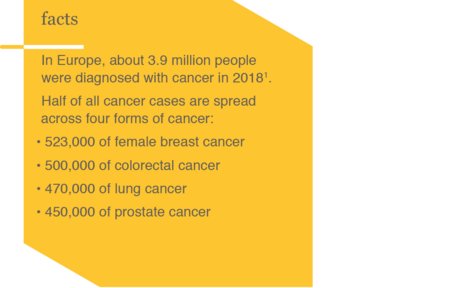 ©jes2uphoto - stock.adobe.com
©jes2uphoto - stock.adobe.com
Close cooperation
ed* Nr. 01/2020 – Chapter 3
Close cooperation: early screening
The establishment of screening programmes, for example, is basedon the Council Recommendation of 2003, which provides for organised, widespread, quality-based screening programmes for breast cancer, colorectal cancer and cervical cancer. A 2017 report by the International Agency for Research on Cancer showed that 25 Member States had implemented or planned to implement screenings for breast cancer, 22 for cervical cancer and 23 for colorectal cancer. European guidelines help support the process.
In 2005, breast cancer screening was first introduced in Germany for women between the ages of 50 and 69. Colorectal cancer screening for men aged 50 and older followed in 2019, and a cervical cancer program for women aged 20 to 65 years was introduced earlier this year. Personal invitations – in addition to quality and success control, the hallmarks of the screening programmes – are sent out by the health insurance funds for the latter two programmes.
In addition, the German Social Accident Insurance will in future offer insured persons who have been exposed to asbestos follow-up screening using biomarkers in order to detect mesotheliomas and lung cancer at an early stage. Mesothelioma is a cancer that develops as a result of inhaling asbestos particles. Using biomarkers developed by the Institute of Prevention and Occupational Medicine (IPA), nearly 50% of mesotheliomas can be detected up to one year before clinical diagnosis.

ERN as flagship project
Since 2017, European Reference Networks (ERN) for rare diseases have enabled the networking of medical expertise at 24 priority sites. Virtual case conferences are used to promote the exchange of knowledge and create specialised care services for patients with rare diseases. Currently, approximately 900 medical units from over 300 hospitals in 26 EU Member States are connected to the ERN.
Included in the 5,000 to 8,000 rare diseases are more than 300
cancers. Three ERNs specialises in rare cancers:
- ERN EURACAN specialises in rare adult solid cancers.
- ERN GENTURIS is for patients at high hereditary risk of developing cancer; it takes a family-based approach.
- ERN PaedCan focuses on access to specialised care for children with cancer.
The ERNs also provide answers to many questions that rare cancer patients cannot receive in conventional healthcare.
Exposure Database
Another example can be found in workplace safety. In Germany, the Hazardous Substances Ordinance stipulates that carcinogenic or mutagenic substances must be documented, archived and disclosed. Employers are obliged to keep a register of employees at risk to exposure from such substances.
This obligation originates from EU Directive 2004/37/EC on the protection of workers from the risks related to exposure to carcinogens or mutagens, which aims to protect workers from carcinogens and limit exposure to these substances. The Directive now covers 27 carcinogens.
The German Social Accident Insurance has established a central exposure database to support companies with this. The aim is to store the data in order to be able to identify possible correlations between working conditions and illnesses even after often very long latency periods.
Joint Actions
A classic example of good European cooperation are Joint Actions (JA), EU initiatives where representatives of each Member State draw up recommendations for joint projects at European level. Since 2009, there have been four successive JAs on cancer; the current one, Innovative Partnership for Action Against Cancer (iPAAC), runs until 2021. Initiatives resulting from the JA include the launch of national cancer plans and the establishment of a European Cancer Information System (ECIS). Germany established its cancer plan in 2008.
Cancer registries – data, knowledge, transparency
The German Cancer Plan also saw the start of the expansion of clinical cancer registries, which became law in 2013. Clinical cancer registries provide data on the care of cancer patients and information on developments in cancer therapy. Around 90% of these registries are financed by the health insurance funds, which have a strong interest in improving care. The clinical cancer registries also provide input to the certification process of cancer centres, which is an integral part of quality assurance in cancer care.
There are also epidemiological cancer registries that collect data on the incidence, mortality, survival time and distribution of cancer. The epidemiological registries provide data to the German Centre for Cancer Registry Data (ZfKD) in Berlin and are linked to the European Network of Cancer Registries (ENCR). This network was established in 1990 as a result of the first action plan ‘Europe against Cancer’ and aims to improve the quality, comparability and availability of cancer data. Sharing information in European networks offers enormous potential for collecting research data and finding new strategies for prevention and treatment of common diseases such as cancer.
But it’s not only cancer registries that generate data. Basal-cell skin cancer is a chronic disease and has been officially recognised as an occupational disease since 2015. As part of the GENESIS-UV research project, the Institute for Occupational Safety and Health (IFA) of the German Social Accident Insurance has been collecting exposure data from various occupational groups involved in outdoor work for several years in order to increase knowledge about radiation doses during outdoor activities and to support tailor-made prevention concepts.

